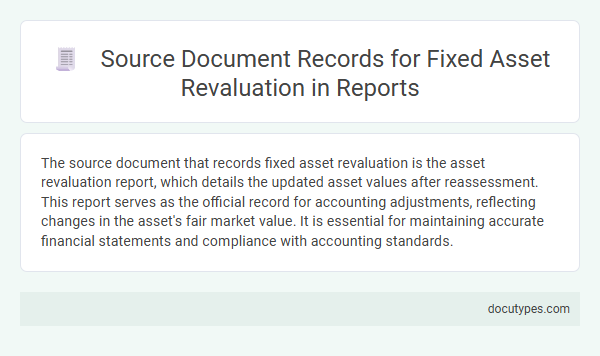The source document that records fixed asset revaluation is the asset revaluation report, which details the updated asset values after reassessment. This report serves as the official record for accounting adjustments, reflecting changes in the asset's fair market value. It is essential for maintaining accurate financial statements and compliance with accounting standards.
Introduction to Source Document Records in Fixed Asset Revaluation
What source document records fixed asset revaluation? Source documents such as revaluation reports and appraisal certificates are essential for recording fixed asset revaluation. These documents provide verified evidence of the updated asset values used in financial reporting and asset management.
Importance of Accurate Source Documentation
Source documents that record fixed asset revaluation are critical for maintaining accurate financial records and compliance with accounting standards. These documents provide verifiable evidence of asset value changes, ensuring transparency and accountability in asset management.
- Revaluation Reports - Detailed assessments conducted by certified appraisers outlining the current market value of fixed assets.
- Adjustment Vouchers - Official documents authorizing and documenting changes in asset values within the accounting system.
- Supporting Invoices and Contracts - Original purchase agreements or service contracts that justify the revaluation adjustments.
Types of Source Documents for Asset Revaluation
Source documents for fixed asset revaluation are essential for accurately recording changes in asset values. These documents provide evidence and justification for adjustments made in the accounting records.
Types of source documents include appraisal reports, which assess the current market value of assets, and valuation certificates issued by certified professionals. Other documents such as purchase invoices, sale agreements, and asset condition reports also support the revaluation process.
Essential Elements in Revaluation Source Records
Source documents that record fixed asset revaluation are essential for maintaining accurate financial records and compliance with accounting standards. These documents typically include revaluation reports, appraisal certificates, and adjustment journals that detail the updated asset values.
Essential elements in revaluation source records consist of the asset identification, original cost, revalued amount, date of revaluation, and the basis or method used for the valuation. Documentation must also include the approval signatures, supporting evidence from professional appraisers, and any regulatory references to ensure transparency and accuracy.
Document Workflow for Fixed Asset Revaluation
The source document that records fixed asset revaluation is the Fixed Asset Revaluation Register, which captures all adjustments made to asset values. This document initiates the document workflow by serving as a primary record for review and approval within asset management systems. The workflow progresses with validation, updating of asset ledgers, and final authorization ensuring accurate financial reporting of revalued assets.
Internal Controls and Authorization Procedures
The source document that records fixed asset revaluation is the Fixed Asset Revaluation Report, which serves as the official record for adjustments to asset values. Internal controls and authorization procedures ensure the accuracy and legitimacy of the revaluation process through documented approvals and audit trails.
- Fixed Asset Revaluation Report - This document records details of asset value changes, including original values, revalued amounts, and reasons for revaluation.
- Authorization Procedures - Revaluations require formal approval from management or the finance committee to verify legitimacy and compliance with accounting policies.
- Internal Controls - Segregation of duties and audit trails prevent unauthorized adjustments and ensure data integrity during the revaluation process.
Compliance with Accounting Standards and Policies
| Source Document | Purpose | Compliance with Accounting Standards |
|---|---|---|
| Revaluation Report | Records detailed asset valuation adjustments performed during a fixed asset revaluation process. | Ensures adherence to International Accounting Standard (IAS) 16 on Property, Plant and Equipment, requiring assets to be carried at revalued amounts. |
| Valuation Certificate | Issued by certified professional valuers to validate the revised asset values. | Supports compliance with Generally Accepted Accounting Principles (GAAP) by providing independent evidence for asset revaluation. |
| Journal Voucher | Documents the accounting entries necessary to update asset values and accumulated depreciation in the ledger. | Maintains accurate financial reporting in line with your organization's accounting policies and the Financial Accounting Standards Board (FASB) guidelines. |
| Fixed Asset Register Update | Reflects the revalued asset amounts, including changes in depreciation schedules. | Ensures audit trail completeness and transparency, meeting internal control requirements and statutory compliance. |
Common Challenges in Source Document Management
Source documents recording fixed asset revaluation typically include appraisal reports, revaluation journals, and updated asset registers. Common challenges in managing these documents involve ensuring accuracy, maintaining proper authorization, and safeguarding against data loss or tampering. Effective document management systems and clear audit trails are essential to address these issues and support compliance with accounting standards.
Best Practices for Maintaining Revaluation Records
Source documents that record fixed asset revaluation are essential for accurate financial reporting and regulatory compliance. These documents ensure transparency and traceability in asset value adjustments.
- Revaluation Report - A formal document prepared by qualified valuers detailing the updated asset values and justifications.
- Board Resolution - An official record of approval from the company's board endorsing the revaluation process and its outcomes.
- Fixed Asset Register Update - A ledger entry reflecting the revised asset values post-revaluation, maintaining an accurate asset history.
Maintaining detailed, organized, and authorized revaluation source documents supports audit readiness and enhances asset management practices.
What Source Document Records Fixed Asset Revaluation? Infographic

